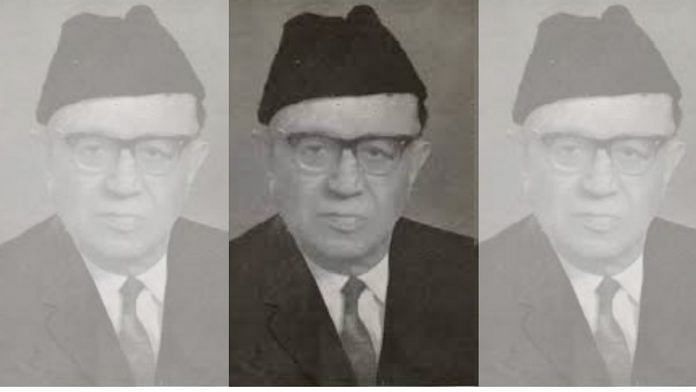Urdu playwright Imtiaz Ali Taj’s name is forever linked with the tragic fate of the courtesan and dancer, Anarkali. His famous play immortalises the lore and legend around Emperor Akbar’s favourite dancing girl. According to Taj’s story, Abkar ordered Anarkali to be entombed in a wall after his son Prince Salim, aka Emperor Jehangir, fell in love with her. The 1960 Bollywood film Mughal-e-Azam was adapted from the same play.
Described as the ‘Taj Mahal’ of drama by critic Ishrat Rahmani, Imtiaz Ali Taj remains a prominent figure in the literary world even after his death. He was murdered in 1970.
In many ways, the success of Anarkali eclipsed his body of work. He is credited to have written more than a hundred books. He edited a children’s magazine and hosted a radio show. He took over as director of Majlis, a translation board, in 1958, and made it a prolific and dynamic literary institution, as per a report in Dawn. Under his watch, Majlis produced as many as 180 books, most of which were annotated versions of Urdu classical literature.
A born litterateur
Imtiaz Ali Taj was born in Lahore on 13 October 1900 to a family of artists and literary scholars. His father, Shamsul Ulema Syed Mumtaz Ali was a writer, journalist and religious scholar. He was also the founder of Dar-ul-Ishaat Punjab, one of the leading publishing houses of undivided India that produced hundreds of books.
Imtiaz Ali Taj’s mother, Muhammadi Begum was the editor of a magazine, Tehzeeb-i-Niswan, which her husband launched in 1898. Skills such as writing, editing, compiling and publishing were part of his childhood years.
He was born Imtiaz Ali but adopted ‘Taj’ as part of his name, in memory of his mother. It was her nickname for him. She would often call him “Mera Taj (my crown).”
His father started an educational children’s magazine, Phool, for Taj’s ninth birthday. The monthly became a household name, running successfully for over 40 years. During this time, Taj took over as editor, catapulting the magazine to newer heights after his father’s death in 1935.
In 1918, when Taj was only 18 years old, he established a literary monthly magazine Kehkashan, in partnership with his friend, journalist and poet Maulana Abdul Majeed Salik. But the venture lasted for only two years. Soon after it closed, he began writing Anarkali.
A prolific writer, he brought out several biographies during his lifetime. These included accounts on scholar and Urdu writer Mohammad Hussain Azad, poet Hafeez Jalandhari and author-cum-humourist Shaukat Thanavi.
His biography of Mahatma Gandhi, Bharat Sapoot, has a prologue by Moti Lal Nehru.
Journalism, too, ran in Taj’s blood, and he gave it a shot—albeit briefly—by working with Tehzeeb-i-Niswan, the magazine founded by his father and run by his mother.
Also read: ‘My name is Prem, Prem Chopra’—India’s favourite villain is more than a Bollywood bad boy
The many versions of Anarkali
Taj began writing Anarkali after he graduated from the Government College, Lahore, where he completed his Bachelor’s in Arts. He wrote it in 1922, but it took a decade for it to be published. According to Taj, no theatre accepted it. They wanted alterations, “which were not acceptable to me,” he wrote in the foreword.
The play was considered too high-brow back when Urdu theatre was more about love, romance and comedy—elements missing from Anarkali at the time. As a result, it did not gain traction among film producers.
A few years later, Lahore’s first movie studios started to pop up. Taj sensed an opportunity and tried to get filmmakers to adapt his play into a movie. His efforts bore fruit, and Loves of a Moghul Prince was released in 1928, starring silent-era star Seeta Devi as Anarkali.
Unfortunately for Taj, the same year, R.S. Choudhury’s Anarkali, which was produced by the Imperial Film Company, was released. The movie featured Sulochana (Ruby Myers)—India’s biggest celebrity at the time—and was quite a hit. Taj’s dream project was overshadowed by it. But after Choudhury’s film gained popularity, he updated the play to suit the audience’s tastes better, adding dramatic elements and several crests and troughs to give us the 1931 version we are familiar with today.
But it was K. Asif’s Mughal-e-Azam that truly immortalised Taj’s Anarkali. The movie, which took more than 10 years to make, was mostly based on Taj’s play and did extremely well at the box office.
Taj’s achievements didn’t end here. After Anarkali, he created Chacha Chakkan, a comedic character based on Jerome K. Jerome’s Three Men in a Boat. “This character was developed and naturalised in the local milieu so successfully that it has become one of the most famous humorous characters of Urdu literature,” said Dawn.
As director of Majlis-e-Traqi-e-Adab or Board of Advancement of Literature in Lahore, he tracked down and retrieved a sizable quantity of texts of traditional Urdu play. He was working on compiling these plays into 30 volumes and managed to publish seven before his death—an accomplishment so grand that it earned him a place in the annals of Urdu literary history.
Imtiaz Ali Taj was stabbed multiple times in his Lahore home at midnight on 19 April 1970. While he survived the consequent surgery, he succumbed to his wounds eventually. His assassins could never be traced or identified.
(Edited by Zoya Bhatti)



